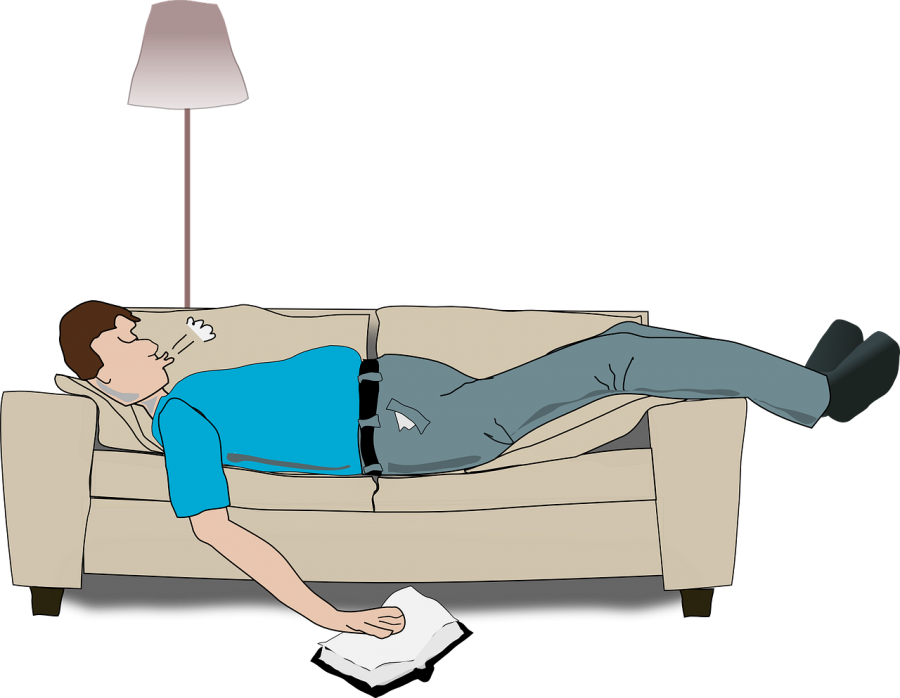How To Maximize Your Performance On Exams: A Biological Overview
disruption of circadian rhythm can lead to fatigue and impaired cognitive abilities.
January 21, 2021
Oftentimes, students stay up late the night before an exam to get extra last-minute studying in. However, this extra study time that may seem to give an advantage the next day only hurts students.
There has long been scientific research to prove that staying up past your usual bedtime will lead to lower test scores the following day. This is all linked to the concept of Circadian Rhythm.
What is Circadian rhythm? (Biological overview)
Circadian Rhythm is the human’s internal clock. It dictates when one sleeps and wakes up and is regulated through a release of hormones that tell our bodies whether it is time to wake up or get ready to sleep. Humans naturally have a set internal clock resulting from the Period and Cryptochrome.
Circadian Rhythm as a whole is a complicated negative feedback loop where these genes, once activated by the CLOCK and BMAL protein molecules attached to them, encode PER and CRY proteins respectively and form two complexes: PER/PER complex, PER/CER complex. As the name suggests, these complexes consist of either a combination of PER molecules or PER and CER molecules. If these proteins fail to form the given complexes, they will rapidly degrade in the cytoplasm of the cell.
Once these complexes have been formed, they enter the cell’s nucleus, where they switch off the CLOCK and BMAL protein complexes, and therefore the Period and Cryptochrome genes. This is because they are attached to this complex as a result of the first step. This is how the negative feedback loop is achieved. After a while, the protein complexes degrade and reactivate the genes, resulting in the regulation of PER and CER concentrations inside the cell. The entire cycle takes around 24 hours to complete, therefore establishing an internal clock.
This internal clock facilitates many components of daily life. This article will focus on the secretion of melatonin and cortisol. Now that the body has established its method of timekeeping, it can release certain hormones at appropriate times.
Melatonin is a hormone that is key to controlling sleep. The body begins to produce melatonin around 9 p.m. in the standard circadian rhythm which signals the body that it is time to head to bed. This hormonal secretion increases drowsiness and aids in sleep. Individuals with sleep disorders often take supplemental melatonin to help sleep.
Cortisol has a reverse effect of melatonin and is therefore complementary to it. Cortisol secretion begins in the body around 7:30 a.m. while melatonin production stops, and signals the body that it is time to wake up. This cycle ensures that an individual will maintain a naturally consistent sleep pattern.
Disrupting this natural clock is an often occurrence today. There are many ways this may occur. The most notable of which is jet travel. Jet lag is caused by the continuation of the circadian rhythm. Since this rhythm does not reset instantaneously, when an individual travels a long distance from one place to another, their internal clocks are often set to the location from where they came and will often continue to remain this way for several days. Most people who have flown to places where there are large time differences have found it hard to sleep for many days following their arrival. This is because the secretion of melatonin begins at the same time as always but 9 p.m. in California is 9 a.m. in Dubai so someone who has flown from California to Dubai will likely begin to feel drowsy only at 9 a.m. Information on how to combat Jet Lag can be found here.
Another common occurrence that disrupts circadian rhythm is exposure to blue light. Blue light is present in nearly all electronic devices and suppresses melatonin production and secretion. Watching TV at night or scrolling through TikTok before bed may make it harder to fall asleep. A simple way to combat such exposure is the use of blue light glasses, which filter out the blue light from reaching your eyes or switching your device to “night shift.”
The simplest way to disrupt the circadian rhythm is to simply stay up later than you normally would. The circadian rhythm takes anywhere from a few days to two weeks to become established so rejecting the body’s natural signals to sleep will result in a disruption of this previously set clock, confusing the body and often triggering mental effects.
How does disrupting Circadian rhythm affect mental performance?
Disruption of the circadian rhythm will often result in the triggering of signal pathways. When one decides to stay up later than normal, the body falls into its natural state and senses that there must be a reason for this change in pattern. The body assumes that it is most likely in a state of danger which is why it will not go to sleep. This triggers a fight or flight response and increases internal adrenaline levels. Following this, it will be much harder to fall asleep and less sleep than normal will likely be acquired that night.
Once this state of sleep deprivation is instigated, mental performance will be severely hindered the following day. The most profound effects are on memory recollection, decision making and concentration. Individuals with less than average sleep the night before an exam will likely find it more difficult to recall the objectives they stayed late into the night to learn and even information they knew the day before. Along with this, a sleepy mind is not a sharp mind. Lower abilities to make decisions will almost certainly impair a student’s performance on an exam, as they will be less proficient in selecting the correct answer. Concentration during an exam is arguably as, if not more, important than the retention of the information on the exam. If it is hard to understand what the question is asking for, it is impossible to answer it.
A question that is often posed is: I can perform well on less sleep on normal days, why would sleeping more benefit me now? The question is often straightforward but overlooked by many. Evidently, with a lack of sleep, you will not be able to perform at your maximum capacity. This is not to say that it is plausible to do well on an exam with insufficient rest, but as students, it is the goal is to maximize your intellectual ability to translate to a reflection of the student’s true mental capability on the exam.
How does a lack of sleep lead to these issues? Biologically, disrupting your circadian rhythm and not receiving enough sleep disrupts the hormonal levels inside your body and brain. Levels of serotonin, dopamine and cortisol are disrupted from the norm. When hormonal imbalances such as these occur, mood swings are increased and cognitive abilities are decreased.
How do I make sure my mental performance is at a maximum for the next day’s exam?
Now comes the true question. It is the day before the exam. What can a student do to ensure maximum reflection of their intellectual abilities the next day? This article will create a comprehensive list to achieve this.
The main goal the day before an exam is to mentally prepare rather than study, as studies show information absorbed this late in the process will not be retained. The most beneficial activities to do the day before an exam include exercising, meditating, eating/drinking and sleeping.
Exercise is largely beneficial to allow your body to perform at maximum capacity. While it is not advisable to conduct an intense workout, a simple walk around the neighborhood or a yoga session will help increase blood flow in your brain allowing it to intake more oxygen. This will result in increased cognitive abilities. Exercise will also help calm the body down and reduce stress.
Another way to reduce stress is meditation. Meditating to soft music will help with sleep as well as reduce stress. Calming experiences will greatly increase mental performance the following day as under stress, memory is not as proficient.
Proper nutrition the morning of the exam is just as important as any other factor. If a student does not consume the proper amount of nutrients that morning, their blood sugar levels will likely drop, which will lead to fatigue of the body as well as of the mind. This fatigue will directly translate to a lack of focus during the exam which will hinder performance. Drinking water is also crucial to mental performance. A study conducted by the Nation Institute of Health has proven that a mere 1- to 2% deficit of water will impair cognitive abilities.
Finally, the center of this article is sleep. As it has been proven, sleep is essential to maximize performance the day before an exam. The best way to not worry about this the night before an exam is to set a schedule a week before the exam. Sleep at the same time and wake up at the same time every day. This will set a circadian rhythm making it easy to fall asleep at that time on that last day. Along with this, ensure that this rhythm includes a minimum of eight hours of sleep a night.
Individuals who follow these suggestions will affirm that their cognitive abilities will be at a maximum and scores will reflect their true intellectual ability.


